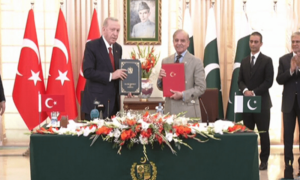ISLAMABAD:
The salaried class’s income tax payments have jumped to Rs285 billion in seven monthsRs100 billion more than the comparable periodas Minister of State for Finance Ali Pervaiz Malik hints at reducing the burden in the budget.
Also, nearly Rs100 billion more in income tax that the salaried people were forced to pay from July through January was Rs25 billion more than the government’s estimates for the full fiscal year.
“The tax burden on the salaried class is more than its capacity to pay, and some of it will be shifted to other sectors in the budget,” said Ali Malik while speaking at a seminar on Navigating Ease of Doing Business in Pakistan.
The Minister of State said that despite the reluctance of Prime Minister Shehbaz Sharif, Rs75 billion in additional burden had to be passed on to the salaried class in the last budget for the sake of the International Monetary Fund (IMF) programme.
However, during the JulyJanuary period of this fiscal year, the salaried class paid close to Rs285 billion in income tax compared to a little over Rs185 billion paid in the same seven months of the last fiscal year.
In just seven months, the salaried class paid Rs100 billion, or 53%, more in the midst of a high cost of living with no social benefits in return.
In the last fiscal year, the salaried class paid Rs368 billion in taxes.
The state minister on finance said that the PM had reluctantly accepted putting Rs75 billion in additional burdena figure that has already been surpassed with five months still left until the close of the fiscal year.
The details showed that non-corporate sector employees paid Rs122 billion this yearhigher by Rs36 billion or 41%.
The corporate sector employees paid Rs86 billion in income taxhigher by Rs28.6 billion or 50%.
The provincial governments’ employees paid Rs48 billionRs23 billion or 96% more. The federal government employees paid Rs29 billionRs11 billion or 63% more.
The government has failed to get due taxes from wholesalers and traders. The at-source tax deductions from non-registered traders are shown as the criterion for success.
The National Assembly on Tuesday delayed approval of a bill to ban economic transactions by ineligible persons to support the real estate sector.
While speaking at the seminar organised by CORE and the Baby Food and Nutrition Council, Malik admitted that high taxation on the beverage industry was also resulting in an increase in the size of informal production.
The organisers displayed smuggled and locally produced unregistered children’s nutrition products that were two times cheaper than those produced by registered businesses. These products were also posing health risks, while the provincial food authorities and the Competition Commission of Pakistan (CCP) remained inactive.
“Below-quality infant formula products are a ticking bomb, and it’s time that regulatory agencies wake up,” said Dr Usman Bhatty, a representative of the Baby Food and Nutrition Council.
“Food and nutrition goods are smuggled from Iran, and we can’t do much about it,” said Asif Khan, Director of the Balochistan Food Authority.
SIFC expands
Jameel Qureshi, the Secretary to the Special Investment Facilitation Council (SIFC), also spoke about his organisation’s role in attracting investment and removing barriers to business.
Qureshi said that the council was also working to make the Pakistan Sovereign Wealth Fund operational.
The Pakistan Democratic Movement (PDM) government had enacted the Pakistan Sovereign Wealth Fund Act in 2023 to transfer shares of seven profitable entities and then sell them overseas to raise money.
These entities include Oil and Gas Development Company, Pakistan Petroleum Limited, Mari Petroleum, National Bank of Pakistan, Pakistan Development Fund, Government Holdings (Private) Limited, and Neelum-Jhelum Hydropower Company.
The IMF has raised objections to the governance structure and the legal mandate of the sovereign fund to directly sell state assets to foreign nations without a competitive process.
The Wealth Fund is dormant after the IMF objected to its law and proposed sweeping amendments.
The finance ministry had agreed in writing with the IMF that by December 2024, it would amend the Act. However, it has not amended the law.
The legal amendments could not be introduced due to differences between the IMF and the finance ministry over the mode of those changes. The government saw no need to bring legal amendments for the governance structure, which could be done through rules and regulations.
Qureshi said that the SIFC was working on reducing electricity prices, optimising the use of Special Economic Zones (SEZs), and preparing feasibility studies for 100 bankable projects.
“Bureaucracy doesn’t properly guide investors, and this is where SIFC comes in,” said the secretary. The SIFC was working on eight areas that are imperative for long-term growth.
Qureshi said there is a need to transition to an export-led growth model and implement a long-term economic roadmap. The secretary said that prompt decision-making was also needed and that for sustainable growth, there is a need to separate good foreign investment from bad investment.
He said that the SIFC was working to increase domestic production, address tax-related matters, and strengthen dispute resolution mechanisms.
Qureshi said that the chief justice of pakistan would this month name the Investment Ombudsman for dispute settlement. He said that a reduction in energy prices and interest rates was also imperative for long-term economic growth.
- Desk Reporthttps://foresightmags.com/author/admin/










